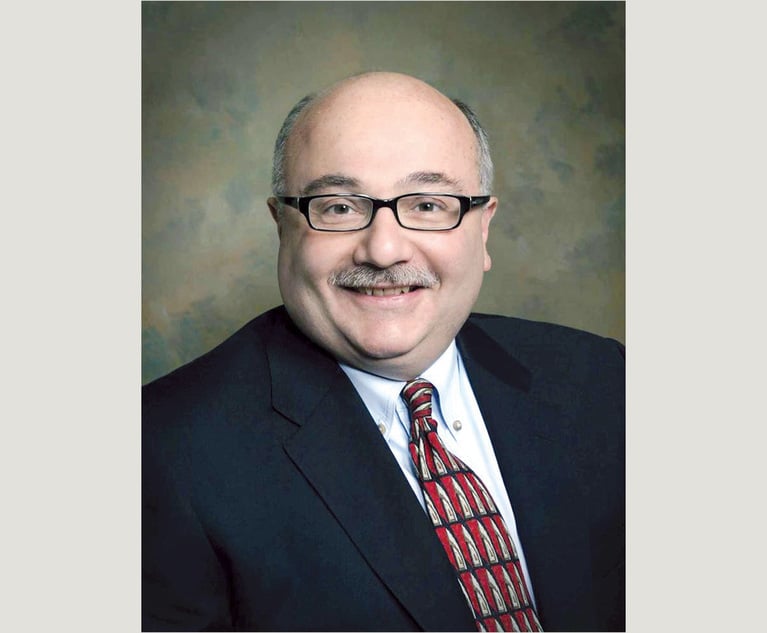Litigation Lessons From Cyberattacks: Separation Is Key To Ensuring Work Product Doctrine Protection
This article discusses decisions that provide a roadmap for savvy counsel to guide the retention of an expert while simultaneously preserving applicable privileges from disclosure.
March 04, 2022 at 02:30 PM
8 minute read
 The COVID-related increase in the number of employees working remotely has created an unexpected consequence: heightened risk of cyberattacks as employees are logging on to office networks through personal computers which may not be as secure as office environments. Inasmuch as it often takes six months or more for the unprotected business to realize that it has been violated, many of the intrusions which have already occurred have yet to surface, likely leading to a spate of ancillary litigation during 2022.
The COVID-related increase in the number of employees working remotely has created an unexpected consequence: heightened risk of cyberattacks as employees are logging on to office networks through personal computers which may not be as secure as office environments. Inasmuch as it often takes six months or more for the unprotected business to realize that it has been violated, many of the intrusions which have already occurred have yet to surface, likely leading to a spate of ancillary litigation during 2022.
When a lawsuit related to such an intrusion inevitably occurs, counsel's first call will likely be to a cybersecurity company that can provide potential expert witness services on the "5Ws" (who, what, where, when and why) concerning the attack. Oftentimes, the violated company may not have cybersecurity services in place prior to the intrusion, and the retention of the expert will originate with counsel. But what occurs when a cybersecurity vendor is already in place at the time the attack occurred prior to counsel's retention? How can counsel coordinate with a vendor to prepare for trial and gain a technical understanding—which is cloaked by privilege—such that the corresponding reports are shielded from disclosure?
Qualifying for the benefits of the Work Product Doctrine is essential to ensure that documents and communications remain shielded from disclosure during discovery. However, courts generally disfavor assertions of evidentiary privileges because they shield evidence from the truth-seeking process; as such, these privileges are confined to the narrowest limits. Thus, proper formalities must be implemented to avoid the waiver of the protections afforded by the Work Product Doctrine.
This content has been archived. It is available through our partners, LexisNexis® and Bloomberg Law.
To view this content, please continue to their sites.
Not a Lexis Subscriber?
Subscribe Now
Not a Bloomberg Law Subscriber?
Subscribe Now
NOT FOR REPRINT
© 2025 ALM Global, LLC, All Rights Reserved. Request academic re-use from www.copyright.com. All other uses, submit a request to [email protected]. For more information visit Asset & Logo Licensing.
You Might Like
View All
Decision of the Day: District Judge Vacates Magistrate's Ruling to Disqualify Prosecutors in Kidnapping Case


Decision of the Day: Judge Precludes Ballistics Expert's Opinion on Scene for 2016 Fatal Police Shooting
Law Firms Mentioned
Trending Stories
- 1AstraZeneca Files Flurry of Lawsuits to Protect Cancer Treatment Drug
- 2American Airlines Legal Chief Departs for Warner Bros. Discovery
- 3New Montgomery Bar President Aims to Boost Lawyer Referral Service
- 4Deadline Extended for Southeastern Legal Awards
- 5Church of Scientology Set to Depose Phila. Attorney in Sexual Abuse Case
Who Got The Work
Michael G. Bongiorno, Andrew Scott Dulberg and Elizabeth E. Driscoll from Wilmer Cutler Pickering Hale and Dorr have stepped in to represent Symbotic Inc., an A.I.-enabled technology platform that focuses on increasing supply chain efficiency, and other defendants in a pending shareholder derivative lawsuit. The case, filed Oct. 2 in Massachusetts District Court by the Brown Law Firm on behalf of Stephen Austen, accuses certain officers and directors of misleading investors in regard to Symbotic's potential for margin growth by failing to disclose that the company was not equipped to timely deploy its systems or manage expenses through project delays. The case, assigned to U.S. District Judge Nathaniel M. Gorton, is 1:24-cv-12522, Austen v. Cohen et al.
Who Got The Work
Edmund Polubinski and Marie Killmond of Davis Polk & Wardwell have entered appearances for data platform software development company MongoDB and other defendants in a pending shareholder derivative lawsuit. The action, filed Oct. 7 in New York Southern District Court by the Brown Law Firm, accuses the company's directors and/or officers of falsely expressing confidence in the company’s restructuring of its sales incentive plan and downplaying the severity of decreases in its upfront commitments. The case is 1:24-cv-07594, Roy v. Ittycheria et al.
Who Got The Work
Amy O. Bruchs and Kurt F. Ellison of Michael Best & Friedrich have entered appearances for Epic Systems Corp. in a pending employment discrimination lawsuit. The suit was filed Sept. 7 in Wisconsin Western District Court by Levine Eisberner LLC and Siri & Glimstad on behalf of a project manager who claims that he was wrongfully terminated after applying for a religious exemption to the defendant's COVID-19 vaccine mandate. The case, assigned to U.S. Magistrate Judge Anita Marie Boor, is 3:24-cv-00630, Secker, Nathan v. Epic Systems Corporation.
Who Got The Work
David X. Sullivan, Thomas J. Finn and Gregory A. Hall from McCarter & English have entered appearances for Sunrun Installation Services in a pending civil rights lawsuit. The complaint was filed Sept. 4 in Connecticut District Court by attorney Robert M. Berke on behalf of former employee George Edward Steins, who was arrested and charged with employing an unregistered home improvement salesperson. The complaint alleges that had Sunrun informed the Connecticut Department of Consumer Protection that the plaintiff's employment had ended in 2017 and that he no longer held Sunrun's home improvement contractor license, he would not have been hit with charges, which were dismissed in May 2024. The case, assigned to U.S. District Judge Jeffrey A. Meyer, is 3:24-cv-01423, Steins v. Sunrun, Inc. et al.
Who Got The Work
Greenberg Traurig shareholder Joshua L. Raskin has entered an appearance for boohoo.com UK Ltd. in a pending patent infringement lawsuit. The suit, filed Sept. 3 in Texas Eastern District Court by Rozier Hardt McDonough on behalf of Alto Dynamics, asserts five patents related to an online shopping platform. The case, assigned to U.S. District Judge Rodney Gilstrap, is 2:24-cv-00719, Alto Dynamics, LLC v. boohoo.com UK Limited.
Featured Firms
Law Offices of Gary Martin Hays & Associates, P.C.
(470) 294-1674
Law Offices of Mark E. Salomone
(857) 444-6468
Smith & Hassler
(713) 739-1250







